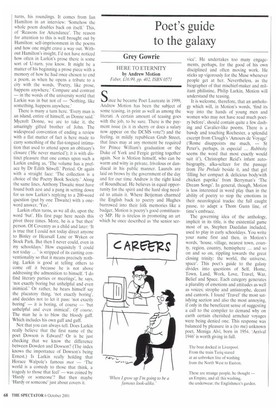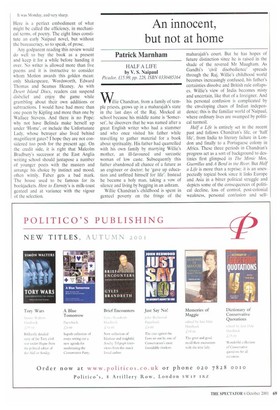Poet's guide to the galaxy
Grey Gowrie
HERE TO ETERNITY by Andrew Motion Faber, £16.99, pp. 402, ISBN 0571 Since he became Poet Laureate in 1999, Andrew Motion has been the subject of some teasing, in print as well as among the literati. A certain amount of teasing goes with the job, to be sure. There is the payment issue (is it in sherry or does a salary now appear on the DCMS vote?) and the feeling, in mildly republican Grub Street, that lines may at any moment be required for Prince William's graduation or the Duke of York and Fergie getting together again. Nor is Motion himself, who can be warm and witty in private, frivolous or dandiacal in his public manner. Laurels are laid on brows by the government of the day and for our time Andrew is the right kind of Roundhead. He believes in equal opportunity for the spirit and the hard slog needed to attain it. Where Betjeman charmed the English back to poetry and Hughes burrowed into their folk memories like a badger, Motion is poetry's good constituency MP. He is tireless in promoting an art which he once described as 'the senior ser
vice'. He undertakes too many engagements, perhaps, for the good of his own disciplined and often moving work. He sticks up vigorously for the Muse whenever people get at her. Nevertheless, as the biographer of that mischief-maker and militant philistine, Philip Larkin, Motion will understand the teasing.
It is welcome, therefore, that an anthology which will, in Motion's words, 'find its way into the hands of young men and women who may not have read much poetry before', should contain quite a few dashing and Cavalier-like poems. There is a bawdy and touching Rochester, a splendid excerpt from dough's 'Amours de Voyage' ('Rome disappoints me much. — St Peter's, perhaps, in especial ... Rubbishy seems the word that most exactly would suit it'), Christopher Reid's infant autobiography, alka-seltzer for the passage from The Prelude beside it, and that girl 'filling her compact & delicious body/with chicken paprika' from Berryman's 'The Dream Songs'. In general, though, Motion is less interested in word play than in the ability of poetry to stop the emotions in their neurological tracks: the full caught pause, to adapt a Thom Gunn line, of time's embrace.
The governing idea of the anthology, implicit in its title, is the existential game most of us, Stephen Daedalus included, used to play in early schooldays. You write your name first and then, in Motion's words, 'house, village, nearest town, county, region, country, hemisphere ... and so on and so on, rippling towards the great closing trinity: the world, the universe, space'. This poet's guide to the galaxy divides into questions of Self, Home, Town, Land, Work, Love, Travel, War, Belief and Space. Each category generates a plurality of emotions and attitudes as well as voices; strophe and antistrophe, decani and cantons. I found 'Travel' the most satisfying section and also the most annoying, if only in the beneficent sense of suggesting a call to the compiler to demand why on earth certain cherished armchair voyages were being denied one. This response was balanced by pleasure in a (to me) unknown poet, Moniga Alvi, born in 1954. 'Arrival 1946' is worth giving in full.
The boat docked in Liverpool. From the train Tariq stared at an unbroken line of washing from the North West to Euston.
These are strange people, he thought — an Empire, and all this washing, the underwear. the Englishmen's garden. It was Monday, and very sharp.
Here is a perfect embodiment of what might be called the efficiency, in mechanical terms, of poetry. The eight lines constitute an early Naipaul novel, but without the bureaucracy, so to speak, of prose.
Any godparent reading this review would do well to buy the book as a present and keep it for a while before handing it over. No writer is allowed more than five poems and it is instructive to consider whom Motion awards this golden mean: only Shakespeare, Wordsworth, Edward Thomas and Seamus Heaney. As with Desert Island Discs, readers can suspend disbelief and enjoy the game while grumbling about their own additions or subtractions. I would have had more than one poem by Kipling and more than one by Wallace Stevens, And there is no Pope; why not have Belinda make herself up under 'Home', or include the Unfortunate Lady. whose betrayer also lived behind magnificent gates? I hope they are not considered too posh for the present age. On the credit side, it is right that Malcolm Bradbury's successor at the East Anglia writing school should juxtapose a number of younger poets with the masters and arrange his choice by instinct and mood, often wittily. Faber gets a bad mark. The house used to be famous for its bookjackets. Here to Eternity's is milk-toast genteel and at variance with the vigour of the selection.



































































































 Previous page
Previous page